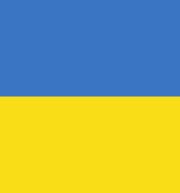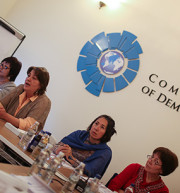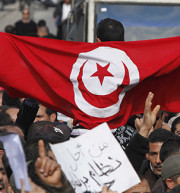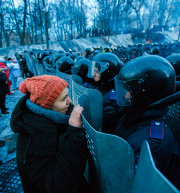
This page summarizes cases raised with Ukraine by the Special Rapporteur between May 1, 2011, (when the Special Rapporteur took up his functions) and February 28, 2017 (the date of the last public release of communications). Communications are released to the public once per year. This page also contains observations on these communications and on responses received from Ukraine. Communications and observations are divided into sections based upon which observation report they originally appeared. Each communication is referenced as urgent appeal (UA), allegation letter (AL), joint urgent appeal (JUA) and joint allegation letter (JAL) - the hyperlinks lead to these documents. This is followed by the date the communication was issued, as well as the case number and the State reply (also hyperlinked if available). Summaries and communications are published only in the language of submission (in the case of Ukraine, English). First Report (May 1, 2011 to March 15, 2012) None Second Report (March 16, 2012 to February 28, 2013) Joint urgent appeal, 21/12/2012. Case no. UKR 3/2012. State Reply: 18/03/2013. Alleged attack against LGBT rights defenders. Observations The Special Rapporteur would like to thank the Government of Ukraine for replying to the communication he sent during the reporting... Continue reading →

(WARSAW, Poland) – Political will is a major obstacle in ensuring civil society’s access to resources in many OSCE countries, according to participants in a May 7 regional dialogue organized in Warsaw by the Community of Democracies and the team of UN Special Rapporteur Maina Kiai. “It’s not a question of convincing through enough human rights laws or standards,” said one participant. Sometimes “they can’t be convinced.” The dialogue was the first event in a new two-year project focused on enhancing space for civil society and strengthening the right to access financial resources. The project was launched in February, and is being funded by the Swedish Ministry of Foreign Affairs. The May 7 Warsaw event looked at international human rights norms, standards and mechanisms to promote the right to freedom of association – and possible ways to strengthen these tools. More than 20 members of civil society from throughout the OSCE region participated. The focus on political will was central to the discussions, with one participant saying that talking about human rights norms to the government in his country was like “talking to the wall.” As a result, the road to ensuring civil society’s access to resources will require creative schemes and new ways of thinking, participants said –... Continue reading →

The Journal of Global Ethics has published an essay by Maina Kiai, in which he reflects on the first three years of his mandate, and the global state of assembly and association rights three years after protests exploded in Tunisia, sparking the Arab Spring. The essay, “Three years after Tunisia: thoughts and perspectives on the rights to freedom of assembly and association from United Nations Special Rapporteur Maina Kiai,” is available for free download to the first 50 people; subsequent access is by purchase only. Although Kiai’s mandate was created in late 2010 against the backdrop of shrinking space for civil society, a massive and growing global protest movement has grabbed most of the headlines since 2011. Kiai argues that the mandate has made a measurable impact – having helped raise awareness of repressive NGO laws, provided technical assistance to governments to strengthen assembly and association rights and developed soft law. But perhaps the most important work of the mandate, he argues, has been its contribution to a better understanding of just how important the rights to freedom of peaceful assembly and association are. “These rights satisfy people’s fundamental desire to take control of their own destinies,” Kiai writes. “They need to speak out, to work together... Continue reading →

GENEVA – Representatives of the largest body of independent experts in the United Nations human rights system today called for an immediate end to renewed clashes in Kiev and other parts of Ukraine that have seen numerous deadly casualties and scores of injuries among the protestors and the security forces. “We are horrified by what has been happening in Kiev,” said Chaloka Beyani, who currently heads the Coordination Committee of international experts appointed by the UN Human Rights Council. “We strongly condemn the excessive use of force by the security forces against the protestors. We urge restraint and an urgent, independent and thorough investigation into the forces’ action.” “We further urge the authorities to shed full light on the several cases of enforced disappearances of protestors since late November 2013,” Mr. Beyani pointed out. “Similarly, we condemn the alleged repeated targeting by the security forces of media personnel who report on the protests, and urge the forces to respect and facilitate their work.” The group of international human rights experts stressed that those responsible for ordering and perpetrating arbitrary killings, enforced disappearances, acts of torture and other human rights violations are accountable for their actions under national and... Continue reading →